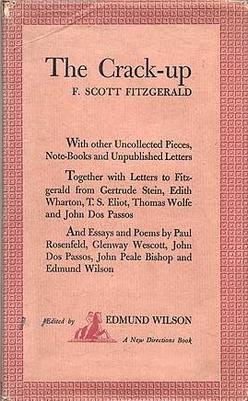Top Qs
Timeline
Chat
Perspective
The Crack-Up
Essay collection by F. Scott Fitzgerald From Wikipedia, the free encyclopedia
Remove ads
The Crack-Up is a 1945 posthumous collection of essays by American author F. Scott Fitzgerald. It includes three essays Fitzgerald originally wrote for Esquire which were first published in 1936, including the title essay, along with previously unpublished letters and notes. After Fitzgerald's death in 1940, Edmund Wilson compiled and edited them into an anthology that was subsequently published by New Directions in 1945.
This article needs additional citations for verification. (January 2010) |
Remove ads
Essays
- "The Crack-Up" (originally Esquire magazine, February 1936)
- "Pasting It Together" (originally Esquire magazine, March 1936)
- "Handle With Care" (originally Esquire magazine, April 1936)
- collected together under the title The Crack-Up in the book
The book also includes other essays by Fitzgerald and positive evaluations of his work by Glenway Wescott, John Dos Passos, and John Peale Bishop, plus letters from Gertrude Stein, T. S. Eliot, and Edith Wharton in 1925 praising Fitzgerald's novel The Great Gatsby.
Remove ads
Legacy
Upon initial publication, the essays were poorly received and many reviewers were openly critical, particularly of Fitzgerald's personal revelations and his admission of his pessimistic outlook. Critics have since referred to the collection as "a compelling psychological portrait and an illustration of an important Fitzgerald[ian] theme".[1]
French philosopher Gilles Deleuze adopted and further conceptualized the term crack from "The Crack-Up" in The Logic of Sense.[2]
Remove ads
In popular culture
The title of the 2017 Fleet Foxes album Crack-Up was inspired by these essays.[3]
References
External links
Wikiwand - on
Seamless Wikipedia browsing. On steroids.
Remove ads

